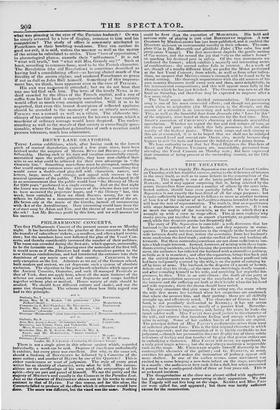PHILHARMONIC CONCERTS.
THE first Philharmonic Concert of the present season was on Monday night. It has heretofore been the practice at these concerts to forbid the transfer of subscribers' tickets,—a needless, and often a hard restric- tion; but the members have now followed the plan of the Vocal Con- certs, and thereby considerably increased the number of their auditors. The room was crowded during the first act ; which appears, universally, to be the favourite one. In glancing over the materials of the first bill, it would seem as if the Directors had made themselves parties to the new German confederation, and had interdicted the entrance into their dominions of any music save of that country. CHERUBIM is the only exception on the list. Admirers as we are of the German school, both modern and ancient, we yet deprecate such a system of absolute exclusion. The objection to the patchwork selections which appear at the Ancient Concerts, Oratorios, and such ill-managed Festivals as that of York, does not apply here, where all the main features of the scheme are complete works, and not fragments and scraps huddled together without plan or method. Hence variety of style should be studied. We should have different colours and shades, and not the same tint throughout. The scheme will show bow little regard was had to this principle.
ACT I.
Sinionia„ No.7 BEETHOVEN. Scene, Mrs. II. R. BISHOP. " Di Primavera" (Der Figlkner's Braun MARSCIINER. Concerto (iii E. Rat) Pianoforte. Sir. MoseilETES BEETHOVEN. Duetto, Mrs. Senuiw and rlrs. FL It. HIsitoe, r,ccianio" (Jessonda) Svoutt.
Overture "Mceresstille " (Best time of perfortunuee).F.MENDIMSSOHNHABTUOLOY.
ACT If.
Sinfonia. No.9.
Aria. Mrs. ALERT n SHAW. "0 Salutaris hostia" HAYDN.
Quaiteilo. two Violins. Viola, and Violoncello, Messrs
MOIL I, WATTS, MURATA% and Liam Sy IIATDN. Quartette, Mrs. it. It. Risme, Mrs. SEGTIIN, Mrs. A SHAW, and Mr. lloitacasrix, AndrO ramino" (Idamenett) MOZART. Overtitie (E,ryanthr) C. M vox WEDE.H. 1,Coller. Mr. F. (7 RA SIER—Condttetor, Sir G EOROE SMART.
There is not a single piece in this scheme against which, regarded individually, a word can be said. Degrees of excellence undoubtedly it exhibits, but every piece was excellent. But why, in the same act, should a Sinfouia of BEETHOVEN be followed by a Concerto of the same author; and another of Haves: by one of his Quartets? This is either carelessness or want of judgment. The style of every great writer has an identity of character, write what he will. His compo- sitions are the overflowings of his own mind, the outpourings of his spirit—they are part and parcel of himself. We see the purity and the majesty of MILTON'S soul equally in the amuses in the Paradise Lost. Just so the character of BEETHOVEN shines out in his works in strong contrast to that of Ilavnis. For this reason, and for this alone, the Concerto failed to produce all the effect which it otherwise would have }done. The sauce was different, but the viand was the same. Nothing could be hoer than the execution of MOSCHELES. His bold and nervous style of playing is just what BEETHOVEN requires. A new Overture by MENnei.ssonn has just been published, and it enabled the Directors to insert an instrumental novelty in their scheme. The cons plete tif:ie is Die Meerestille and yluckliche Fahrt (The calm Sea and prosperous Voyage). The first movement depicts the gentle modals of tl.le waters, and the second the joy that " ehees the sailor's breast on reaching his destined port in safety. Of the two movements ws- r.referred the former ; which exhibits a masterly and interesting series: of combinations : the second rather fails in interest. As a work of art, though of a totally different kind, we prefer the Motet performed at the last Vocal Concert; from which, as well as from other indica- tions, we suspect that MENDELSSOHN'S strength will he found to lie In choral writing. His thorough acquaintance with the old masters of his own country discovers itself every now and then, most delightfully, in his instrumental compositions; and this will appear more fully in the Oratorio which he has just finished. The Overture was new to all the band on Saturday, and therefore may be expected to improve after a few more trials.
The Vocal music merits decided commendation. Mansomea's song is one of his most successful efforts ; and though not possessing nmeh claim to originality (for Manscnsra is the disciple, not the master of a school) is an interesting and well-written composition. This, as well as the beautiful duet from Jessonda (the " Lass f fir ihn" of the original), were heard at these concerts for the first time. Mrs.. SHAW'S execution of CH FRP RINI'S charming air demands unqualified approbation. Whether we regard the fine and rich volume of tone, or the chaste and pure style which this lady possesses, both are alike worthy of the highest praise. While such songs and such singing as this are at command, it is to be hoped that we shall not be indulged with second-hand and second-rate Opera airs, merely because they happen to suit the taste and humour the indolence of a prima donna.
We have authority to say that her Royal Highness the Dutchess of KENT and the Princess VICTORIA are, unavoidably, prevented from attending the Vocal Concert on Monday next ; but have expressed their intention of being present at the succeeding concert, on the 14th March.


























 Previous page
Previous page